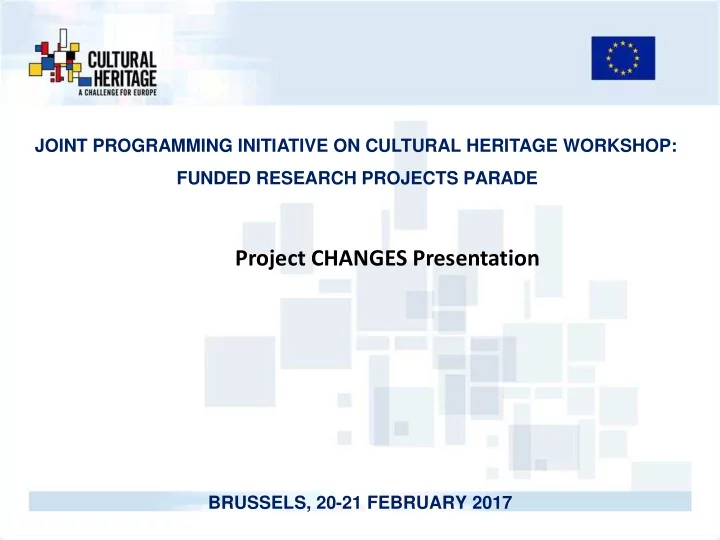

JOINT PROGRAMMING INITIATIVE ON CULTURAL HERITAGE WORKSHOP: FUNDED RESEARCH PROJECTS PARADE Project CHANGES Presentation BRUSSELS, 20-21 FEBRUARY 2017
Project Participants Politecnico di Milano (I) University of Leuven (B) Technische Universiteit Delft (NL) Uppsala University (S) Foppoli Moretta e associati (I) Associate Partners Monumentenwacht Vlaanderen (B) Monumentenwacht Noord-Brabant (NL) Consorzio Villa Reale e Parco di Monza (I) Na.Gest (I) Assimpredil ANCE (I)
people
Main themes of the project • conservation and valorization as preventive measures; • effectiveness of maintenance, involving relevant craftsmanship and expertise; • economic mechanisms underlying built heritage conservation in the context of regional economy and the wider construction sector; • impact of knowledge gain and its dissemination on smart economy for built heritage conservation, heritage management and construction sector.
The main theme of the Project : comparison of different schemes to innovate Conservation Process Management Use Conservation Valorization Control of : • Costs and revenues • Occupancy comfort • Safety/Security • Maintenance Energy Efficiency • Prevention Conservation Monumentenwacht • … Decision Halland Model Program Distretti Culturali Management system Design Works Quality Conservation planning
Main goals of the project The expected outcomes, to be transferred to stakeholders and society, in order to increase social and human capital at a local level are: • a better understanding of cultural heritage as a tool for the empowerment of local communities; • a progress of methods for enhancing quality in the conservation of built heritage; • a better understanding of preventive conservation systems; • a better understanding of the links with environmental enhancement; • an improved cost-effectiveness for private owners and managers of historic properties; • a proposal for a funding scheme supporting a sustainable conservation process.
Activities performed The project encompasses: • comparing the three models (Monumentenwacht, Halland Model, Distretti Cultruali); • action-learning in The Netherlands, Belgium and Lombardy Region, involving the Associate Partners; • analyses on the expected benefits; • proposal of an integrated scheme.
Activities performed The comparison among the three models is aimed at highlighting the output of the three different models on the various expected benefits of investments in cultural heritage: that is conservation, but also impacts on economy and society. Governance and social capital Enhancement Description Conservation of capacity / People / Impact on of the model quality Impact on skills Community decision the market involvement making Monumentenwacht Halland Model Distretti Culturali
Activities performed The Netherlands
Activities performed Belgium
Activities performed Italy • Follow-up of «Distretti Culturali» projects (Monza, Valtellina) • Preventive Conservation: best practices and techniques • Planned Conservation and knowledge management in Villa Reale, Monza
Activities performed Sweden The Research Team visited most of the conserved buildings to make a balance after the elapsed time; the model is now under development addressing the governance issue for a better sustainability
Stakeholder involvement and dissemination activities performed so far
Stakeholder involvement and dissemination activities performed so far 10th International Conference Structural Analysis of Historical Constructions 13-15 September 2016, Leuven, Belgium International Conference Innovative built heritage models and preventive conservation 6-8 February 2017, Leuven, Belgium
Press Review
Future activities • Publication of the proceedings of the Conference “Innovative built heritage models and preventive conservation” (Leuven, 2017, February 6th-8th ) as a peer-reviewed book • Finalising action-learning activities: comparison of the outputs and recognition of the input for WP6 • Publication of an Executive Summary related to the outputs of WP2, WP3, WP4, WP5 • Scientific research on financial components of preventive conservation, taking into account also the costs/benefits analysis of preparedness to major risks • Organisation of a plenary final meeting • Publication of three scientific papers on peer-reviewed journals
The expected results of the project and the private sector CHANGES research explores the thesis that Preservation activities, provided they are carried on with the aim at opening minds, can empower the economy of a region. In other words, Heritage may create the “ learning environment ” where innovation and creativity can be developed . It’s a turnover: from an economic empowerment of Culture to a cultural empowerment of Economy.
Policy Makers and Influencers, Cultural Heritage Research Community The expected results of CHANGES Project should foster innovation in Preservation processes providing Policy Makers and Influencers with tools and schemes capable: • To Implement preventive conservation and preparedness to risk • To Implement Integrated planning in an “upstream” perspective • To Support transition with sound arguments on the consistency of Preservation activities
JPICH Strategic Research Agenda CHANGES project addresses all the themes identified in the strategic research agenda: “Developing a reflective society” “Connecting people with heritage” “Creating knowledge” “Safeguarding our cultural heritage resource” The main addressed targets are: • Capability and Capacity • Management Strategies • Knowledge sharing
THANK YOU! www.changes-project.eu
Recommend
More recommend